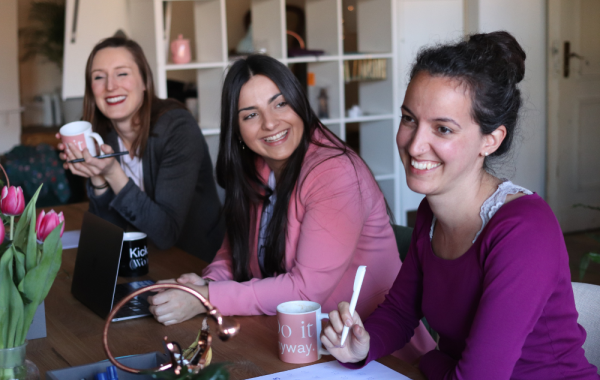The charity National Numeracy’s new Number Confidence and Social Mobility report found that women are significantly less confident with numbers than men and are disproportionally affected by negative experiences of maths at school.
Women also reported greater negative impact on earnings, progression at work and career choices from not having a Level 2 maths qualification (equivalent to GCSE maths grade C/4) than men.
But women who used the charity’s free numeracy improvement website, the National Numeracy Challenge, improved their confidence more than men – 36% compared to 21% - and women’s numeracy skills improved more too.
With 49% of the working age population having the numeracy level of a primary school leaver, this research suggests that supporting women and girls could supercharge the whole nation’s numeracy.
National Numeracy has the largest database of UK numeracy improvers in the UK and used it to investigate how numeracy can drive social mobility, the opportunities for everyone to progress or be the best that they can be without being hampered by socio-economic disadvantage.
Confidence is crucial to numeracy improvement
The new research also discovered that confidence is crucial when it comes to improving numeracy, particularly among those who struggle the most with numbers. It was the dominant factor linked to individual numeracy scores amongst National Numeracy Challenge users.
Overall, 38% of users improved their number confidence having used the National Numeracy Challenge, with younger people (under 35's), females, and those without a Level 2 maths qualification all particularly likely to gain number confidence.
Start improving your number confidence - try the National Numeracy Challenge
Jobs and careers are a major motivator for numeracy
And wanting to improve numeracy to help in their job or career proved a huge motivator – it was the most dominant predictor of increased number confidence.
So, overcoming a lack of number confidence and understanding what contributes to low confidence levels is therefore crucial in raising numeracy standards and career outcomes across the UK.
When it comes to number skills alone, 70% of users improved their number skills, amounting to a significantly positive outcome in moving people towards qualifications, work and opening up opportunities and brighter futures.
The UK’s numeracy levels are significantly below the average for developed countries and poor numeracy costs the UK economy around £25 billion a year.
Maths exams aren't the only way to go
But crucially this research shows this dire situation can be changed, with the right support, helping people check and improve their numeracy, learn everyday maths, gain confidence and work towards the essentials of numeracy in an accessible way, in this instance without a formal course or exam.
Sam Sims, Chief Executive of National Numeracy, said: “It’s an affront to our society that thousands of young people leave school every year feeling negative and fearful about numbers. These experiences can hold people back for a lifetime.
“This report reveals the power of improving number confidence, particularly when it comes to work opportunities and broader learning outcomes. But it also reveals a yawning gap in number confidence between women and men. We cannot possibly improve the numeracy of the nation without addressing that gap.”
Lucy-Marie Hagues, Head of UK at Capital One, which funded the research, said: “This report shows us that there are very real consequences if we do not do more to address the gap in numeracy skills. Talented people aren’t applying for jobs for which they’re otherwise qualified. Women aren’t achieving the financial and career outcomes they deserve. The best opportunities in life are restricted to the fortunate few.
“This report is a call to action. National Numeracy has helped half a million people to build their number confidence and skills. Their work is driving real change and I’m so proud that we’re partnering with them to do everything we can to help.
“But there’s more for all of us to do. We have to change the way we think and talk about numeracy. We have to address our own insecurities about working with numbers, talk to our children differently, remove the shame and the sense of exclusion and transform our number culture. I believe that if we can achieve that shift, we can create the diverse, inclusive, socially mobile society that we all aspire to.”
Ms Hagues is heading a new women and girls working group as part of the National Numeracy Leadership Council. National Numeracy formed the Council in 2022 to tackle the UK’s numeracy crisis with a group of pioneering organisations as well as government departments. It is chaired by Andy Haldane, Chief Executive of the RSA and previously Chief Economist at the Bank of England.
To boost opportunities for individuals and productivity across society, National Numeracy has developed three proposals.
1. Number confidence is an essential driver of social mobility. Widespread acknowledgement and improvement are required in the ‘whole life’ learning journey from the early years and primary education, right into adulthood. The confidence to understand and work with numbers, allied with the practical use of numbers in everyday day life, should form a central pillar of mathematical learning in the UK.
2. Women typically have lower levels of number confidence than men, which raises a high barrier to opportunities, career choices and earnings. Women and girls need to feel inspired and included in numeracy at every stage of the lifelong learning journey. Open acknowledgement and increased awareness of the gender barriers and culture around maths should be supported by an expanded evidence base of what would make maths work for women and girls. Government should ensure this evidence is taken into account in future education plans for both children and adults.
3. Lower maths attainment and number confidence is holding UK PLC back; it is linked to greater negative career impact across earnings, career choices and progression, and costs the economy up to £25 billion a year. To build the skills necessary for a resilient and adaptable workforce and to remain competitive within a changing economy, Government and business should embed the National Numeracy Challenge, and other engagement and confidence-building resources, into adult education, employment and skills-building programmes. This would help to reach hundreds of thousands more people with a proven, cost-effective method of improving numeracy.
Information for journalists
Media contact
Julia Day, Director of External Relations, National Numeracy
Notes to Editors
This report presents the findings of research commissioned by National Numeracy and carried out by Research Partners between July and October 2022. Focussing on users of the National Numeracy Challenge, 1,025 users were surveyed and 24 in-depth interviews with users were conducted. Further information on methodology is detailed in the report Appendix.
About National Numeracy
National Numeracy is the UK’s only charity dedicated to helping people feel confident with numbers and using everyday maths. Our mission is to empower children and adults in the UK to get on with numbers so they can fulfil their potential at work, home and school. Our work improves how people understand and work with numbers in everyday life, sparking better opportunities and brighter futures. National Numeracy is a registered company (company no: 7886294) and charity (charity no: 1145669).






